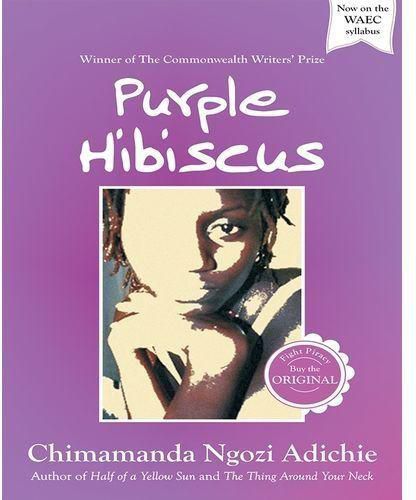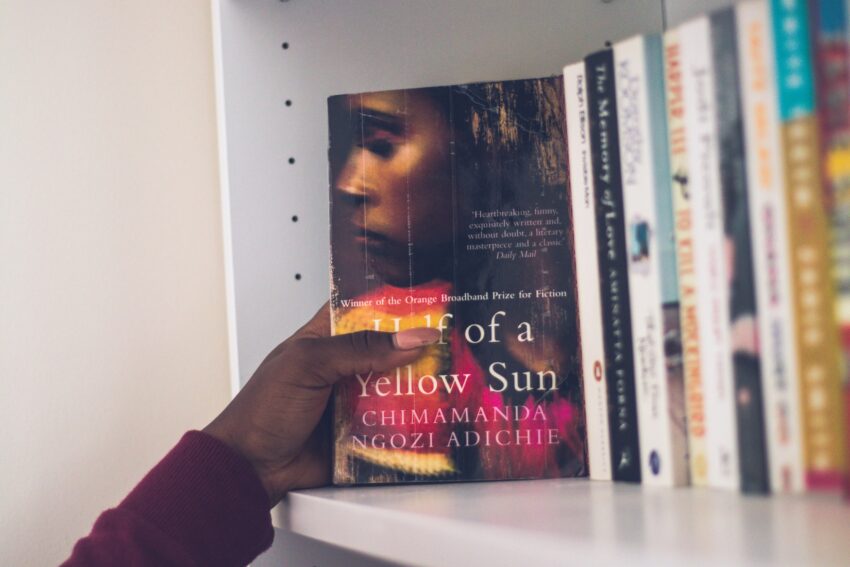Thirteen odd years ago, in my final leg of senior secondary, my school got a new literature teacher– Mr Eden. Mr Eden was graceful. Even while wielding a whip, he talked and walked like little blue birds helped him get dressed in the morning.
In his second week in school, we had a conversation about writing influences and at the time, obsessed with detective and mystery novels, I excitedly told him about my fascination with these books and how much I was learning about pain, ambition and betrayal from them. He looked at me with what I now know to be an indulgent smile and said “Yes. But, how much of your identity can you find in those stories?” and proceeded to lend me three of his favourite books, one of which was Chimamanda Adichie’s “Purple Hibiscus.”

I had flirted with African fiction in the past, but it was always “recommended texts” and burdened by the tyranny of compulsion, they never felt like much fun. I finished Purple Hibiscus in a few days and realized that almost overnight, I had been given the words to express how I felt about being a growing woman in a largely patriarchal society and about the culture of servitude demanded from “last born children” and thus began my lifelong romance with African Fiction.
What is the point of this story?
Here’s the thing, conventional career wisdom teaches us to stay current with industry trends by reading the latest studies and articles. So, we read all the high sounding business and brand books, filling our bookshelves with impressive titles hosting words like “culture,” “strategy” and “innovation.” Fiction on the other hand is often put on the back burner, or labelled as “for leisure.”
While all these non fictional materials can offer valuable insight into specific areas and in fact help better our understanding of the market, at its core, successful marketing boils down to how well you can use communication tools to tell your story.
So here are 3 major reasons fiction– specifically African fiction needs to make its way to the shelves and hands of more marketing people across Africa:
- Vocabulary: Reading more fiction will fundamentally serve to elevate your written communication. The marketing person’s zen is to be able to have the sort of vocabulary that helps us express ourselves and connect with others. Fiction can help you get there– by teaching your brain to absorb grammar and recognise new ways to create clearer communication; whether its new vocabulary or more precise ways of stating a concept. Read enough, and you will notice your speech patterns shift and your written communications become more concise. This will translate into better ideation, campaign planning, more structured content writing, briefs, reporting and if nothing else, your business emails will see vast improvements and be easier to write.
- Cultural Attunement: Reading works from authors who share similar backgrounds as your core consumer groups can have a big impact on your ability to profile audience types, allowing you to get into their heads, embrace different experiences and interrogate their backgrounds, motives and drivers. This helps you to step outside yourself and develop more holistic demographic and psychographic segmentation. The richer your audience profiling gets, the better the insights you can garner from them which is a highly valuable experience for any marketer.
- Storytelling Creativity: The fact remains that the not-so-secret ingredient to becoming a better storyteller is to simply read more stories. As you read, you exercise the ability to use imaginative words to evoke powerful images in the minds of your audience. Much like learning the timing and language of a good joke, reading fiction can help you learn how to tell a story in a more compelling way. This skill helps you craft brand stories that not only connects with your audience but shows that you understand their point of view and can speak their language. With the increased focus on storytelling as a central component of marketing, the ability to build a satisfying story arc is a definite plus.Reading more fiction will help you develop all these skills and then some, in a fun and relaxing way so that you turn them into helpful tools in your marketing toolkit.
All said, marketers have a lot to gain from exposure to a range of literature. African Marketers have even more to gain from exposure to literature that is situated in the African context– helping you not only elevate written communication but also glean insight about the African consumer and improve storytelling ability suited to your local audience – all core to better engagement with your audiences.
N.B: Mr Eden, wherever you are today, you should know that by giving me the gift of African fiction, you changed a young girl’s life forever. And for that I will forever be thankful.

